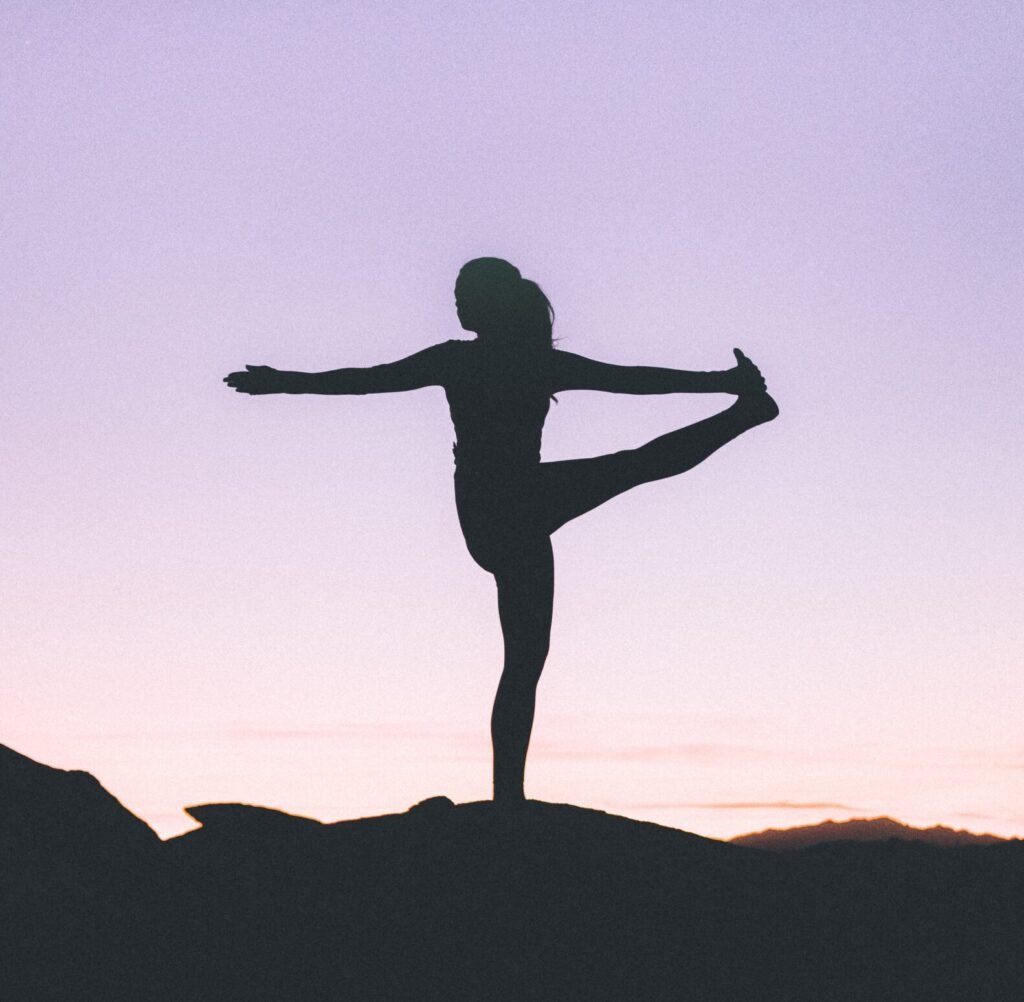Have you ever wondered how people seem to have a secret balance in their lives that make it seem as if they have it all together? Perhaps you feel yourself stressed, overburdened by work, lacking in a social life or just unable to engage in the kind of self-care you know you need, but cannot find the time. You are NOT alone.
However this concept of holistic well-being is still a fairly new topic amassing research this past century whereas the majority of those in the medical field previously laughed at ‘holistic’ medicine as fluff. Now, organizations like the Substance Abuse and Mental Health Services Administration (SAMHSA) who is charged with leading public health efforts in the United States recognize the role holistic wellness approaches and even highlight the 8 dimensions of wellness. Find out what areas of your life need attention to reach overall wellness and how to improve in each area with simple tips.


1. Physical- The physical domain of wellness is obviously referring to our physical bodies and can include things like exercise, nutrition, sleep and sexual health. While all of these dimensions of wellness influence one another, physical wellness may be the foundation of it all because it encompasses our basic needs being met. For example if we do not get adequate sleep our emotions/mood will be altered and we will less likely to be sociable (social) or engaged in learning activities (intellectual). Studies also show that when we feel physically unwell we are more likely to make impulsive decisions such as overspending (financial). The way we combat this is building in a balance of healthy habits such as regular exercise (whatever you are able to do) drinking enough water, eating nutrient rich foods and regularly checking if you are in good physical health with your doctor.
I first noticed how greatly nutrients can impact quality of life when I was recently deficient in iron and vitamin A and was experience serious brain fog and fatigue. No amount of coffee was perking me up and it then drained my ability to want to exercise or even play with my kids. After my doctor recommended I get bloodwork and determined the cause I began taking supplements and trying to incorporate more vitamin rich foods in my diet and my energy and brain function improved greatly! I then had more emotional/social battery for my family and friends as well.
Simple Tip: Take a multivitamin and set a goal to drink more water. If getting to the gym is too hard for you right now, try tracking your steps on your smart phone and striving to step more each day. Notice how you feel…these baby steps will motivate you to keep improving your physical wellness routine.

2. Intellectual- The intellectual dimension of wellness refers to our ability to learn, stay curious and engaged in the world around us and be mentally stimulated. If you are someone who traditionally was not a “book worm” or perhaps school was not for you, look at it more so of flexing your brain muscles in whatever way excites you. For some that may be watching documentaries or true crime shows where they can use critical thinking skills to guess who the murderer was or doing crossword puzzles. Learning new skills and reading blog posts like this count as intellectually stimulating activities and promote overall wellness! For example studies show that those who are habitual readers who engage in life long learning tend to have greater overall satisfaction in life and have improved memory function later in life.
Simple Tip: Find a topic you would like to learn more about and cultivate that curiosity or subscribe to a weekly newsletter to have stimulating content sent to you automatically! Subscribe here
3. Emotional Wellness is where one leaves space for themselves to feel their emotions and express them in a healthy and fulfilling way. It is different for different people of varying levels of sensitivity, like for me I am very empathetic and love to use music or stories to channel emotions and when I feel a feeling I allow it to come out just as it rises up like a wave inside of me. When we don’t allow our emotions to flow through us, it can leave us confused or frustrated as to why we are unhappy within a situation or relationship. This can be difficult if you struggle with judging yourself for your emotions and repress their natural expression (example: never cry, never get angry). It can take time if you were never taught growing up that this is a normal and healthy thing to do or if you expressed your emotions as a child and were told to “just deal”. Today we are unlearning that and embracing that in order to heal we first must feel.
Step one can be just listening to yourself in the way that others might have dismissed you in the past. There is healing in being heard, but sometimes we have to first receive self-validation if we don’t have healthy people in our lives to validate our feelings.
Simple Tip: Explore your feelings when they come and stop and ask yourself why am I feeling this way and just allow yourself to feel how you feel. Try journaling to reflect on emotions and appreciate your growth over time as you increase in self-awareness and coping with negative emotions.
4. Social dimension of wellness looks at human beings innate desire to be connected to others. It is recommended to have at least one healthy social interaction a day, maybe that is just calling a friend and catching up or grabbing coffee. This is going to look different for each person depending if you are an introvert or extrovert what level of interaction “fills” your need for connection. This dimension also can be especially influenced by emotional wellness because if for example you struggle with depression or have explosive anger issues the repercussions socially can cause you to be isolated from good friends or supports that could also positively impact your mental health. If you notice your depression or mental health issues increase to the point where you are lacking in social supports it could be a good time to seek professional help. Social and Emotional wellness are so closely related also because there is nothing more fulfilling than having loving relationships where you can share how you feel and it be received. This promotes overall wellbeing.
Simple Tip: Plan at least one social interaction each day (phone call, text, email, lunch date, etc.). This can double as an emotional wellness tip if you want to send a note or card to a friend or loved one sharing how much you appreciate them in your life! Letting those closest to you know they are valued deepens these relationships.

5. Spiritual Wellness as it relates to our deeper meaning of life. This can be explored and cultivated through prayer, meditation, evaluating your own personal values/beliefs and learning how to live a life in line with these values. To maintain spiritual wellness looks different to various people. For some who don’t practice a specific faith or religion you might be wondering, why does this apply to me? Let me be frank, we are not just meat suits walking the Earth put here for absolutely no reason. No matter what you believe, in order to have quality of life you have to believe in SOMETHING. However when life gets hard and someone is suffering in other dimensions like possibly suffering from chronic pain, financial stressors or a divorce (emotional/social stress) this can lead them to giving up on anything and forming a nihilistic view. As “fluffy” as this sounds research actually shows that having faith and maintaining hope and a positive outlook has benefits even in cancer patients prognosis with treatment. Imagine what it could do if you cultivate a life full of purpose, value and meaning to your overall wellness?
Simple Tip: Cultivate a connection to nature and try to practice mindfulness. Listen to worship music and stay engaged in your Bible daily can also keep you grounded in wisdom and focused on meaningful spiritual principles.

6. Occupational- This dimension is focused on work/career wellness. Depending on your field this could look like professional development, improving in your skills at work, job satisfaction and work life balance. In our fast paced workaholic culture this one plays a HUGE role in disrupting the other dimensions of wellness especially when self-care is discouraged whether directly or subtly even in the healthcare field among medical professions! I mean have you ever seen what nursing or medical school does to a person? Stress levels and suicide risk rates are highest for those students, which says something about the pressure society puts on individuals when it comes to prestigious career choices.
Simple Tip: Ask yourself at the end of your work day, what did I do well? Do I feel satisfied at my job and why? If not assess if you have the power to improve satisfaction or if you should look into finding a new career path.
7. Financial wellness was one dimension I did not fully grasp when I first began learning about it, mainly because finances was never a topic discussed in my family. Things like budgeting, money management, credit scores or being a good steward of resources were all foreign concepts. Flash forward to why after I bought my first house I dealt with a heavy amount of financial stress because I had taken some classes in money management but had not learned how to carry it out as a practice. This dimension also impacts one’s ability in other areas because God knows gym memberships and organic food is not cheap! It also impacts stress and emotions because financial stability impacts a person’s sense of security when it comes to keeping food on the table, lights on and a roof over our heads. Unfortunately, many people when they are stressed then make foolish or impulsive financial decisions because when we are stressed we lack foresight.
There is a term in psychology called the “Ostrich effect” where people avoid any negative information/feedback (like checking your bank account after a vacation) because even attempting to assess a problem for fear of having to address it is too overwhelming. This may temporarily soothe you, but only keeps you stuck in your poor financial habits longer and delays you attaining financial stability and wellness. Step one is take your head out of the sand.
Simple Tip: Make a list of your expenses and income to create a basic budget of your finances to assess financial health. If you have overwhelming debt, set some goals to work on paying it off.
8. Environmental wellness means that where you exist like your physical environment (home, community/surrounding area) impacts your wellness. For example, if your town promotes recycling and keeps their parks and streets clean this promotes wellness. Studies show that a cluttered or messy workspace influences productivity at work the same is true for your home environment if it is cluttered or full of garbage, this reflects on one’s mental wellness. Being in a clean, organized and safe environment allows someone to experience environmental peace/serenity. Some people are more used to the chaos and clutter and this one falls down on their priorities of things to work on and that is okay! This is a wellness journey and wherever you are it starts with awareness, intentionality and working at it each day in little ways.
Simple Tip: Spend 10 minutes de-cluttering trash/debris from a space in your home every day. Commit to keeping one area clean (for me it is my kitchen counters) to have one space that is aesthetically pleasing.

Wellness is all about an ongoing effort to find balance in living a life that provides joy and fulfillment and promotes overall well-being. These 8 dimensions of wellness are just a starting point to highlight what areas you may be lacking in that are influencing other areas. Until recently, I never knew for example that when you improve in one area all the other areas naturally are impacted (Ardell, D.B, 1977) . I had experienced it when I began exercising more regularly that I was choosing healthy foods for my body and I was sleeping better, this improved my emotional and social health as I then had increase energy and confidence. This fact was honestly a game changer for me (a reformed perfectionist) who thought how can I work on 8 different areas all at once!? It was relieving to know that if I focused on even one or two, all dimensions would show marked improvement. We can just start somewhere and it is better than where we were yesterday.
Let me know in the comments below what areas you have had success in and what areas you plan to focus on in the near future!
Stay well,
Cosmi
References:
Ardell, D. (1977). High level wellness: An alternative to doctors, drugs, and disease. Emmaus, PA: Rodale Press.
Stoewen DL. Dimensions of wellness: Change your habits, change your life. Can Vet J. 2017 Aug;58(8):861-862. PMID: 28761196; PMCID: PMC5508938.
https://store.samhsa.gov/sites/default/files/sma16-4958.pdf
https://store.samhsa.gov/sites/default/files/sma16-4957.pdf



Leave a Reply